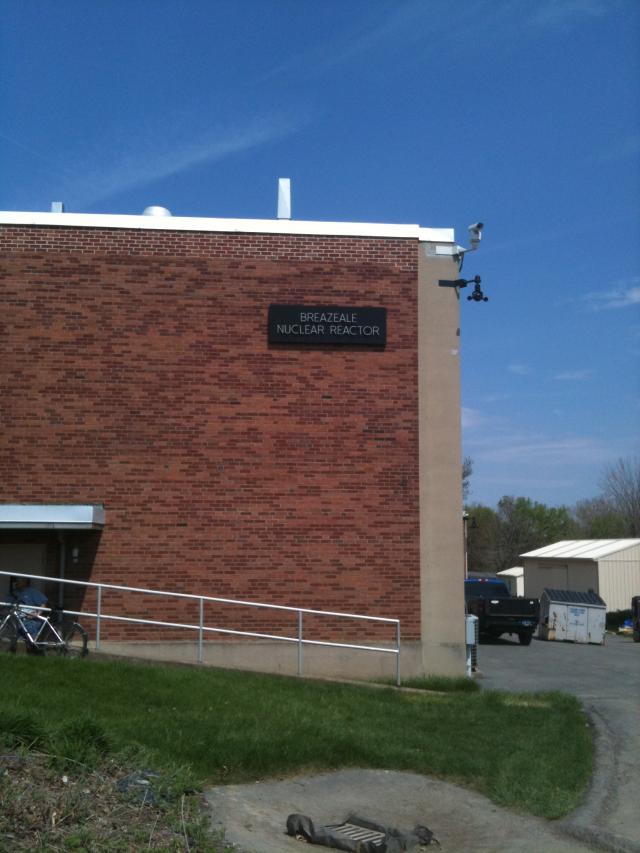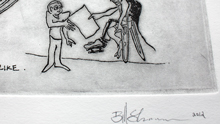TShirts, Stickers, Prints, Art Objects
WhatIsWhat 1.0 2003
REPOST What is the future of Nuclear Accidents?
INNOVATION and ACCIDENT. This past spring I taught a semester long course at Pennsylvania State University called Innovation and Accident. The course involved some reading, some development of tools to define failures in communication and to then address those failures via innovative solutions. The course peaked with a student presentation of different approaches and strategies to problems they defined within their own very personal landscape. The solutions final class involved a group outing to a Nuclear Reactor site used for research on the edge of the main campus of the school.  The class and I listened to the Nuclear Reactor Student Tour Guide speak about the many iterations of our nuclear power future in which nukes were a low pollution alternative to coal, a modular affordable and secure alternative to the mega-large impossibly expensive insecure super nuke plants and finally as a solution to the imminent effect of Peak Oil. When the tour guide finished it was time for questions. The students asked questions about Chernobyl. The question was shot down as "The Russians don't know what they are doing and that could never happen in America." The students asked questions about Three Mile Island which was described as "a very low level release that has been exaggerated by the media and environmentalists." The possibility of a Nuclear War was also discussed but was set aside as an "unlikely scenario" and having little to nothing to do with the nuclear energy question. I only had one question for the tour guide. I knew what it was before I arrived and waited and waited for him to address it or one of the students to ask it for me based on the course readings but he did not cover it and the students did not ask it. My question was, "What is the future of nuclear accidents?" The response? " We hope there isn't one.. There probably wont be one." This course that I taught was based on my philosophy of failure that extends into my dance, my art and my way of life. That philosophy is to embrace ones failings to the fullest extent possible. To in effect own ones greatest weaknesses and through that ownership take control. This has been my instinctual response long before I had the language to define it. In the wake of the BP disaster the course I taught was ahead of its time. This question is now on the tip of everybody's tongue. Is the risk of failure worth the innovation it brings? Often times in my creative process of art and life I would argue that yes it is. However in the case of global survival of nature and humanity I would argue that it is not worth it. When all is said and done. when the relief wells are operational and the flow of oil is brought down to a trackle I imagine that BP will be credited with creating the worlds worst manmade environmental disaster of all time. The funny thing is BP's basic philosophy of failure was the same as the Nuclear Plant Tour Guide. They wrote off a major disaster as unlikely to happen and they hoped it never would happen. They did not embrace their potential for failure and have not advanced their ability to handle failure in any technical way. This was also shown by a hilarious expose of a spill from the 1970's as compared to todays spill. The exact same technology exists from the 70's till now as it relates to the engagement of failure although the innovation of the successful acquisition of oil at greater and greater depths of water and risk has evolved rapidly. in this video clip Rachel Maddow screens the imagery side by side illustrating that as far as Innovation and Accident is concerned, those reaping profits from their innovations have no counter evolution of strategies to contain the greater and greater risks of failure.
The class and I listened to the Nuclear Reactor Student Tour Guide speak about the many iterations of our nuclear power future in which nukes were a low pollution alternative to coal, a modular affordable and secure alternative to the mega-large impossibly expensive insecure super nuke plants and finally as a solution to the imminent effect of Peak Oil. When the tour guide finished it was time for questions. The students asked questions about Chernobyl. The question was shot down as "The Russians don't know what they are doing and that could never happen in America." The students asked questions about Three Mile Island which was described as "a very low level release that has been exaggerated by the media and environmentalists." The possibility of a Nuclear War was also discussed but was set aside as an "unlikely scenario" and having little to nothing to do with the nuclear energy question. I only had one question for the tour guide. I knew what it was before I arrived and waited and waited for him to address it or one of the students to ask it for me based on the course readings but he did not cover it and the students did not ask it. My question was, "What is the future of nuclear accidents?" The response? " We hope there isn't one.. There probably wont be one." This course that I taught was based on my philosophy of failure that extends into my dance, my art and my way of life. That philosophy is to embrace ones failings to the fullest extent possible. To in effect own ones greatest weaknesses and through that ownership take control. This has been my instinctual response long before I had the language to define it. In the wake of the BP disaster the course I taught was ahead of its time. This question is now on the tip of everybody's tongue. Is the risk of failure worth the innovation it brings? Often times in my creative process of art and life I would argue that yes it is. However in the case of global survival of nature and humanity I would argue that it is not worth it. When all is said and done. when the relief wells are operational and the flow of oil is brought down to a trackle I imagine that BP will be credited with creating the worlds worst manmade environmental disaster of all time. The funny thing is BP's basic philosophy of failure was the same as the Nuclear Plant Tour Guide. They wrote off a major disaster as unlikely to happen and they hoped it never would happen. They did not embrace their potential for failure and have not advanced their ability to handle failure in any technical way. This was also shown by a hilarious expose of a spill from the 1970's as compared to todays spill. The exact same technology exists from the 70's till now as it relates to the engagement of failure although the innovation of the successful acquisition of oil at greater and greater depths of water and risk has evolved rapidly. in this video clip Rachel Maddow screens the imagery side by side illustrating that as far as Innovation and Accident is concerned, those reaping profits from their innovations have no counter evolution of strategies to contain the greater and greater risks of failure.

This Work, REPOST What is the future of Nuclear Accidents?, by Bill Shannon is licensed under a CC BY-NC-SA license.
